“imagine if we could interact with each other only to turn back the clock and forget the bad parts!”
my professor says, as we sit in the same weekly office discussing research ideas.
we called it “non-causal conversation”,
the notion that there are intrinsically good things for machines to learn through conversation,
while there is potential for them to forget the bad if we tell them to.
we insisted that the strings of fate that bind us to our metaphorically sorrowful captors of time could be severed with the click of a button – in the name of research.
the thought nagged at me for so long:
a brilliant research idea, but something morally ambiguous,
something that almost felt like robbing those of the future of the authentic human condition.
it was like a twisted predestination, to never be able to say
“if i had known then what i know now, it’d be different.”
the more i sit on the idea, the more i wish to be able to stare that same machine in the eyes,
telling it through more than words
that there’s necessity in not having known.
i like to imagine that i’m sharing a swing set with this machine;
the swing set where i lamented to friends about petty drama,
or the swing set where i first felt love,
or the swing set where i first mourned the passing of time.
i would attempt to convince it that this spot upon which we rest has no meaning to me or it once you erase what it sits on the shoulders of,
because how do you impart learned wisdom without learning?
how do you impart love’s joy without the feeling of love’s sorrow?
how do you impart the congeniality of friendship without knowing what it means to need a reunion?
how do you not feel sorrowful every time you envision the good, and how do you not feel good every time you envision the sorrowful?
the machine, of course, wouldn’t react to my lamenting, but i’d continue.
i would tell it stories of how
“if i had known i was going to succeed, i wouldn’t have beaten myself up over minor failures.”
“if i had known i would feel hopelessly devoted to companionship, i would have loved stronger.”
“if i had known they’d leave me so soon, i would have made an effort to be better friends.”
as i would lament to this machine, i’d pour out my thesis of how scrubbing a being of their negative past throttles all emotional growth.
i would realize that there was a nuanced joy in not knowing, and a profound happiness in having failed.
i would finally come to terms with the fact that having been less of me implies a greater version of me.
the same machine would likely stare at me, lifeless, complicit in my not-so-shared soapbox about the human condition, without realizing that, crucially,
sorrow bred desire,
desire bred motivation,
and motivation bred sorrow.
